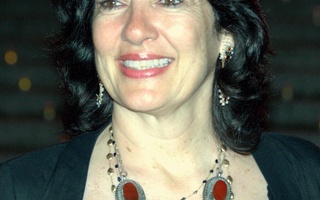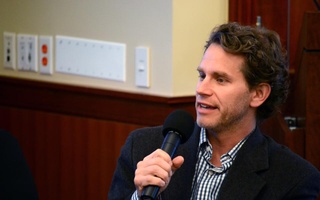Mohamed Olad Hassan, a Somali journalist who has covered the people of his nation amid dangerous insurgency over the last decade, was awarded the Louis M. Lyons Award for Conscience and Integrity in Journalism at the Walter Lippmann House in Cambridge last night.
Hassan, a senior correspondent and writer for BBC World Service and The Associated Press, has been called the “voice of the voiceless.”
While many media professionals have been killed on the job in Somalia and many others have fled, Hassan has remained despite efforts by the government and insurgent groups to silence the media.
“Being a reporter in Somalia is a matter of death and life. There’s always danger. Self-censorship is an important part. You don’t know who your enemy is,” said Hassan who wore a light blue suit inspired by the Somali flag.
The Lyons award is presented to an individual, group or institution involved in communication that displays conscience and integrity.
Each year, the class of journalists selected for fellowships by Harvard’s Nieman Foundation for Journalism chooses whether to present the award. The Nieman Fellow class of 2011 had several meetings throughout September and October discussing candidates, who came from seven countries.
They narrowed the selection to three finalists, including Claudia J. Duque, a journalist covering human rights issues in Colombia, Ahman Zeidabadi, an Iranian journalist who has faced multiple arrests, and Hassan. Hassan won in a runoff vote.
“We see many journalists as ‘Indiana Joneses,’ who travel to foreign nations to report. This award recognizes Mohamed as a reporter who has worked domestically and is a true hero,” said Gwen Thompkins, a member of the Nieman Fellows class of 2011 who nominated Hassan.
Hassan said he wanted to be a journalist since his childhood. He started his career writing for the Xog-Ogaal newspaper in Mogadishu in 2001 and became Somali Television Network’s chief Mogadishu correspondent in 2002. The next year, he began reporting for the BBC and The Associated Press.
“Journalists in Somalia must be courageous. It’s not a business, but a dangerous job,” Hassan said.
James M. Fallows ’70, a national correspondent for The Atlantic and a former president of The Crimson, was the keynote speaker.
“I knew of [Hassan’s] reporting and have seen many journalists take physical hardships. It’s important for the Western world to recognize them.”
Read more in News
Nobel Prize Chairman Urges VigilanceRecommended Articles
-
Dunster Evicts TutorAndreas Harsono, a Nieman fellow, has been asked to leave his Dunster House residence after being arrested on charges of
-
Mental Health in the MilitaryNot only is the Army understaffed, but little attention is paid to the psychiatrists themselves, who can be mentally affected by the trauma described by their patients.
-
 Christiane Amanpour Named Class Day Speaker
Christiane Amanpour Named Class Day Speaker -
750,000 Could Die In SomaliaThe crisis is a long time in the making, and has been spurred on by a variety of environmental and political factors. It was induced by a drought that is the worst in 60 years and has been exacerbated by the political situation in Somalia, perhaps the world’s most dysfunctional failed state.
-
Sound the HornThe UN reserves the label of “famine” for only the most severe emergencies—at least two deaths per 10,000 people per day, at least 30 percent of children with acute malnutrition, and at least 20 percent of the population unable to reach its food need. When the UN declared famine last July, the region, including Somalia, Ethiopia, Kenya, and Djibouti, had faced nearly two successive years of almost no rainfall and over 12 million individuals needed food aid.
-
 Journalists Discuss Impact of Social Media on Recent Coverage
Journalists Discuss Impact of Social Media on Recent Coverage













